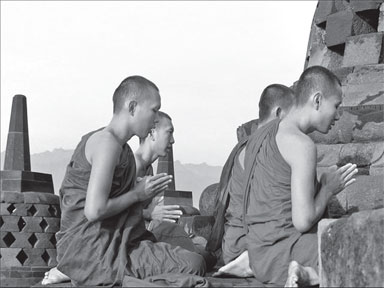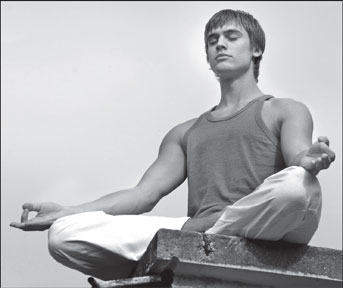|
The Buddhist perspective:
Towards a contented life
By Lionel Wijesiri
The late Ven. K. Sri Dhammananda Thera, in his book Leading a
Buddhist Life, says : “Man is the highest fruit on the tree of
evolution. It is for man to realize his position in nature and
understand the true meaning of his life. To know the purpose of life,
you will first have to study the subject through your experience and
insight. Then, you will discover for yourself the true meaning of life.
|

A group of bhikkhus meditate |
“Guidelines can be given, but you must create the necessary
conditions for the arising of realization yourself. There are several
prerequisites to the discovery of the purpose of life. First, you must
understand the nature of man and the nature of life. Next, you keep your
mind calm and peaceful through the adoption of a religion. When these
conditions are met, the answer you seek will come like the gentle rain
from the sky.”
Nature of man
Let us go a little deep into Ven. Dhammananda Thera’s important
point.
Humans can be seen as highly favoured, in that they have an immediate
reason to seek out the Dhamma and yet also have the means to read and
listen to it and follow it. Among the lower realms, Pretas and dwellers
in the Narakas [Buddhist hell(s)] are gripped by pain and fear, and can
only endure their lot, but cannot better themselves.
Animals are intellectually unable to understand the Dhamma in full.
Most of the Brahmas and Devas simply enjoy reaping the fruits of their
past actions and think that they are immortal and forever to be happy
and so they don’t try to practise the Dhamma. When their past positive
karmas become exhausted, these Devas will fall into lower worlds and
suffer again.
For this reason, life in the world of humans is known as “The
precious human rebirth”. Born close to the pivot point of happiness and
suffering, humans have a unique capacity for moral choices with
long-term significance.
But, are we always making the right moral choices? For instance, take
a particular day; yesterday or any day, for that matter. How many times
have you uttered phrases like “My thoughts are driving me mad! My mind
will not be quiet! I can’t relax!”?
The mind is notoriously resistant to being quiet, so as soon as you
sit still, it seems to do everything it can to distract you. Habitual
thinking kicks in, and within a few minutes, an internal dialogue takes
over, the body starts to fidget and trivial things that need to be done
suddenly appear vitally important. This is happening to most of us,
every day of the year.
The mind has often been compared to a “drunken monkey bitten by a
scorpion.” Just as a monkey leaps from tree to tree, so the mind leaps
from one drama to another, constantly distracted.
Anapanasati
Our minds are always filled with preoccupations, and we do not even
realise it. However, we can just let them go and bring the mind back to
something we do want to focus on. This is a beginning, calming,
waking-up step. However, more important is to choose positive thoughts
to focus on.
|

Regular meditation will reduce stress, anger and grief in
day-to-day life |
Anapanasati, the meditation on in-and-out breathing, is the first
subject of meditation expounded by the Buddha in the Maha Satipattana
Sutta. The Buddha laid special stress on this meditation, for it is the
gateway to enlightenment and Nibbana adopted by all the Buddhas of the
past as the very basis for their attainment of Buddhahood.
The term Anapanasati does not mean mindfulness established only on
‘in and out breathing’. It actually means mindfulness established on an
object all the time with each ‘in and out breath’. Initially, one
establishes mindfulness on the breathing itself, then on different kinds
of feelings, different states of mind, then the characteristic of
impermanence... and finally on relinquishment, which is the ultimate
objective of the practice.
The method of practising Anapanasati, as explained in the Anapanasati
Sutta of the Majjhima Nikaya, is complete in itself. One can understand
and practise this method comparatively easily than the methods found in
other suttas.
Way out
Anapanasati meditation can change your life. It will help you to deal
with the madness and chaos that occur daily. It will deal with the
challenges of your life. It will shift your priorities, enable you to
make friends with yourselves, and to find answers to your problems.
Lighten the load
In a stressed state, it is easy to lose touch with inner peace,
compassion and kindness; in a relaxed state, your mind is clear and you
can connect with a deeper sense of purpose and altruism. A time of quiet
calmness in meditation is, therefore, the most effective remedy for a
busy and overworked mind. Anytime you feel stress rising, heart closing,
mind becoming overwhelmed, just bring your focus to your breathing and
quietly repeat with each in- and out-breath: Breathing in, calm the body
and mind; breathing out, smile.
Let go
Stillness is always there between the thoughts, behind the story,
beneath the noise. What keeps us from experiencing our natural state of
being is the habitual and ego-dominated mind. Meditation enables us to
see clearly, to witness our thoughts and behaviour and reduce
self-involvement. Without such a practice of self-reflection, there is
no way of putting brakes on the ego’s demands. From being self-centred,
we can become other-centred, concerned about the welfare of all.
Dissolve anger and fear
We do not accept or release our negative feelings so easily; we are
more likely to repress or disown them. However, when denied, they cause
shame, depression, anger and anxiety. Meditation invites you to openly
meet them, and to see how selfishness, aversion and ignorance create
endless dramas and fears.
Beneath these is a quiet stillness where you can get to know
yourself; this is a wonderful experience. Whether you practise for just
10 minutes a day or longer does not matter. You are releasing your
limitations, while opening to self-acceptance and awareness.
Awaken forgiveness
Forgiveness is the greatest gift you can give yourself and others. As
you sit in meditation and watch your thoughts and feelings moving
through you, so you can observe that who you are now is not who you were
just a moment ago, let alone a day, a week or a month ago. Who you, or
someone else, was when pain was caused is not who you are now. When you
experience your essential inter-connectedness, you see how the ignorance
of this creates separation and suffering, so that forgiveness for such
ignorance arises spontaneously.
Be aware
Awareness is the key to spiritual awakening. Through awareness, you
can see your dazed mind and all its mischief. Almost everything we do is
to achieve something: If we do this, then we will get that; if we do
that, then this will happen. However, in meditation you just do it.
There is no ulterior purpose other than to be here, in the present
moment, without trying to get anywhere or achieve anything. You are just
aware of whatever is happening, whether pleasant or unpleasant. No
judgement, no right or wrong, it’s simply being aware. |


